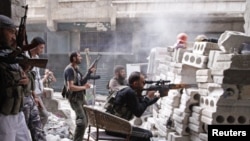DAMASCUS —
As Syria's civil war grinds on, the Syrian government has pointed to outside aid for the rebels as proving there is a conspiracy by the West and Gulf Arab nations to use the conflict as a way to weaken Iran's influence in the region.
The Syrian conflict has split not only the people of Syria, but the region as well. To those close to the government, the battle lines are clear.
Businessman and pundit Nabil Toumeh sees a clash of civilizations. “There is a Sunni-Shi'ite religious conflict, more accurately between the Gulf-Saudi-Turkish project on one hand and the Iranian-Iraqi-Syrian-Lebanese. The intersection is here in Damascus,” he said.
Backers of Syria's opposition say they simply want to help Syrians overcome a brutal leadership. But government supporters and others see a proxy war for competing sectarian interests.
Non-Arab Iran may be the leader of what is called the “Shi'ite Crescent” but according to Syrian ruling party member and political researcher Bessam Abu Abdullah, geography and ethnicity make Syria key.
“Iran without Syria cannot be in the Middle East because it will be isolated in that place. And I think the Gulf countries, they have a phobia: it's called Iran,” he said.
There is a chauvinism to this world view, which places the Shi'ite model above that of the Sunni-ruled Gulf states.
Abu Abdullah says Saudi Arabia feels particularly threatened. “They are afraid because Iran is giving a model for the people - a model in science, technology, universities, in culture, in sports. Saudis is a zero - nothing,” he said.
The pro-government researcher gives high marks to Syria as well, as a multi-faith, secular state with greater equality for women.
While promoting their vision of Shi'ite success, both men agree the current Syrian system is flawed. But they, like the government, insist the problem lies outside.
“Today, if Turks prevent intervention and Gulf people put off funding and arming, Syrians inside or outside will come back to each other immediately,” said the businessman Toumeh.
The brutality of the conflict makes reconciliation seems remote. Some voices in the government-allowed opposition argue that blaming outsiders obscures a fundamental flaw of the Syrian leadership.
Maher Fadl Fetih heads a fledgling opposition party in Damascus.
“They believe that the solution cannot be political and have no solution but force. And this means for every action [they take] there is a reaction,” he said.
Even if no forces outside Syria were involved, it is a cycle of violence that shows little sign of slowing down.
The Syrian conflict has split not only the people of Syria, but the region as well. To those close to the government, the battle lines are clear.
Businessman and pundit Nabil Toumeh sees a clash of civilizations. “There is a Sunni-Shi'ite religious conflict, more accurately between the Gulf-Saudi-Turkish project on one hand and the Iranian-Iraqi-Syrian-Lebanese. The intersection is here in Damascus,” he said.
Backers of Syria's opposition say they simply want to help Syrians overcome a brutal leadership. But government supporters and others see a proxy war for competing sectarian interests.
Non-Arab Iran may be the leader of what is called the “Shi'ite Crescent” but according to Syrian ruling party member and political researcher Bessam Abu Abdullah, geography and ethnicity make Syria key.
“Iran without Syria cannot be in the Middle East because it will be isolated in that place. And I think the Gulf countries, they have a phobia: it's called Iran,” he said.
There is a chauvinism to this world view, which places the Shi'ite model above that of the Sunni-ruled Gulf states.
Abu Abdullah says Saudi Arabia feels particularly threatened. “They are afraid because Iran is giving a model for the people - a model in science, technology, universities, in culture, in sports. Saudis is a zero - nothing,” he said.
The pro-government researcher gives high marks to Syria as well, as a multi-faith, secular state with greater equality for women.
While promoting their vision of Shi'ite success, both men agree the current Syrian system is flawed. But they, like the government, insist the problem lies outside.
“Today, if Turks prevent intervention and Gulf people put off funding and arming, Syrians inside or outside will come back to each other immediately,” said the businessman Toumeh.
The brutality of the conflict makes reconciliation seems remote. Some voices in the government-allowed opposition argue that blaming outsiders obscures a fundamental flaw of the Syrian leadership.
Maher Fadl Fetih heads a fledgling opposition party in Damascus.
“They believe that the solution cannot be political and have no solution but force. And this means for every action [they take] there is a reaction,” he said.
Even if no forces outside Syria were involved, it is a cycle of violence that shows little sign of slowing down.











